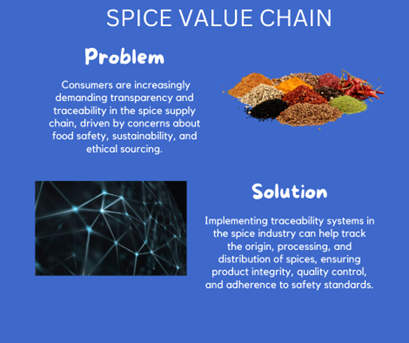Contact: +91 99725 24322 |
Menu
Menu
Quick summary: Discover the significance of traceability in the spice supply chain, ensuring food safety, quality, and sustainability while building consumer trust and compliance with regulations.

The spice supply chain faces mounting pressure to verify the origins and authenticity of its journey. Spices travel across multiple borders and change hands several times before reaching the end consumer, making traceability a complex yet essential aspect of the supply chain. Beyond meeting regulatory requirements, companies must address growing concerns over issues like food fraud, contamination, and ethical sourcing.
One key pain point for companies lies in the opaque nature of traditional supply chains. Without clear insights into each step of production—from farm to shelf—businesses struggle to provide assurances on quality and sustainability. Adopting traceability solutions can empower spice companies to ensure safe, authentic products while building trust with their customers and meeting increasingly stringent global standards.
Key Takeaways
The global spice industry is vast, diverse, and economically vital, spanning regions from South Asia to Latin America and reaching millions of consumers worldwide. With spices being integral to cuisines and cultures, the demand for high-quality, safe, and authentic spices is stronger than ever. However, due to the long and complex journey spices often take—from small farms through multiple processing and distribution stages—ensuring quality and authenticity can be challenging.
Today’s consumers want to know more about where their food comes from and how it was produced. This transparency isn’t just about satisfying curiosity; it reflects a broader shift toward ethical consumption, where buyers actively choose brands that prioritize sustainability, fair trade, and food safety. To meet these expectations, brands and suppliers are pressured to disclose more about their sourcing and production practices. Additionally, regulatory bodies like the U.S. Food and Drug Administration (FDA) are strengthening traceability requirements. For instance, recent FDA rules now require specific tracking for certain dried spices to prevent contamination and ensure food safety. These rules compel companies to maintain detailed records, which can quickly trace any spice batch back to its origin in case of a safety issue.
The journey of spices from farm to your pantry is far from simple. It involves multiple stages that span various regions and often require extensive coordination among farmers, processors, and distributors. Each stage has unique complexities, making traceability in the spice supply chain both challenging and essential.
Traceability in the spice supply chain is fraught with challenges, especially due to the fragmented nature of this global industry.
A leading spice processor based in Karnataka, India, recognized for its dedication to quality and sustainability, has expanded its operations to Vietnam and Turkey. To enhance the authenticity and safety of its products, the company leveraged the TraceX Sustainability platform. This innovative solution enables the processor to implement robust traceability measures throughout its supply chain, ensuring transparency and compliance with safety standards while reinforcing its commitment to sustainability. By utilizing the TraceX platform, the company strengthens consumer trust and maintains its reputation as a reliable source of high-quality spices.

Blockchain traceability solutions offer a comprehensive approach to addressing various challenges in the spice supply chain:
End-to-End Visibility: Blockchain technology provides a transparent and immutable ledger of transactions, enabling end-to-end visibility across the entire spice supply chain. Each transaction, from farm to table, is recorded on the blockchain, allowing stakeholders to track the journey of spices in real-time and identify potential bottlenecks or issues.
Quality Assurance with Tracking of Residual Levels for Export Compliance: Blockchain enables the monitoring and tracking of residual levels in spices, ensuring compliance with export regulations and quality standards. By securely recording data on pesticide use, chemical treatments, and other factors, blockchain technology facilitates quality assurance and helps exporters demonstrate compliance with stringent export requirements.
Regular testing of chili batches for aflatoxin levels is necessary to ensure compliance with safety standards. Quick detection and intervention are critical to prevent contaminated batches from entering the supply chain. Adhering to local and international regulations on aflatoxin levels in food products is mandatory. MTR Foods used TraceX Blockchain traceability solutions to overcome these challenges
Supply Chain Efficiency: Blockchain streamlines supply chain processes by automating documentation, reducing paperwork, and minimizing manual errors. Smart contracts on the blockchain can automate tasks such as payment processing, quality inspections, and logistics management, thereby improving overall supply chain efficiency and reducing operational costs.
Ethical Sourcing: Blockchain traceability solutions promote ethical sourcing practices by providing transparency into the origin and production practices of spices. By recording information such as farming methods, labour practices, and certifications on the blockchain, stakeholders can ensure that spices are sourced ethically and sustainably, without the use of child labour or harmful chemicals.
Consumer Trust: Blockchain enhances consumer trust by providing transparent and verifiable information about the spices they purchase. Consumers can access detailed information about the origin, quality, and journey of spices by scanning QR codes or accessing blockchain-enabled platforms. This transparency builds trust and confidence in the integrity and safety of spice products, ultimately leading to increased consumer loyalty and satisfaction.
The imperative for spice businesses to prioritize sustainable sourcing is multifaceted. Not only does it help maintain a global supply of high-quality spices by discouraging detrimental farming methods, but it also ensures compliance with tightening sustainability regulations in Western countries. Additionally, consumer expectations are evolving, with an increasing demand for products sourced and grown sustainably. Consequently, proving sustainability credentials has become essential for businesses to retain consumer trust and loyalty.
So, how can spice businesses strive to produce fairer, higher quality products sustainably? Despite feeling somewhat powerless, especially in Europe and North America, these businesses play a crucial role in shaping the future of the global spice market. Committing to sustainable sourcing not only aligns with ethical values but also presents tangible benefits, such as the ability to market spices as premium products, thus potentially increasing profits and resonating with conscientious consumers.
The TraceX food traceability platform enhances transparency and accountability in the food supply chain by leveraging advanced technologies such as blockchain. It allows stakeholders—from farmers to retailers—to track and verify the movement of food products in real time, ensuring data integrity and security. With features like real-time tracking, data collection, and integration with existing systems, TraceX enables businesses to monitor sourcing, processing, and compliance with regulatory standards. This not only improves food safety and facilitates swift recalls if necessary but also builds consumer trust by providing detailed product information. Ultimately, TraceX helps businesses optimize supply chain operations while meeting sustainability metrics and regulatory requirements.
Traceability in the spice supply chain is not just a regulatory necessity; it is a critical component for ensuring food safety, quality, and sustainability. By implementing robust traceability systems, stakeholders can confidently track spices from farm to table, mitigating risks associated with contamination and fraud. This transparency builds consumer trust and loyalty while helping businesses comply with evolving regulations. As the demand for ethically sourced and high-quality spices grows, investing in traceability will be essential for businesses aiming to thrive in a competitive market.
Spice supply chain traceability refers to the ability to track the journey of spices from their origin, through processing and distribution, to their final point of sale. This involves documenting every step in the supply chain to ensure transparency, safety, and compliance with regulations.
Traceability is important for consumers because it provides assurance regarding the safety, quality, and origin of the spices they purchase. It helps consumers make informed choices and fosters trust in brands that prioritize transparency and ethical sourcing practices.
Businesses can implement effective traceability systems by leveraging technologies like blockchain, adopting standardized data collection methods, and collaborating with supply chain partners to ensure accurate information sharing. Training staff and establishing clear protocols are also essential for maintaining traceability throughout the supply chain.
